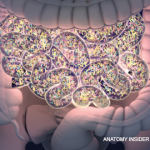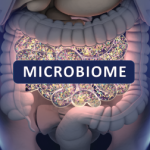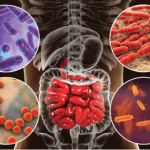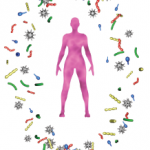Experts at ACR Convergence 2020 addressed how diet & the body’s microbiome affect chronic diseases.


Experts at ACR Convergence 2020 addressed how diet & the body’s microbiome affect chronic diseases.

The use of an interleukin (IL) 17A inhibitor resulted in gut microbial dysbiosis and features of subclinical intestinal inflammation in a subgroup of psoriatic arthritis (PsA) and spondyloarthritis (SpA) patients, according to a multidisciplinary, collaborative study across several institutions published in Arthritis & Rheumatology.1 Understanding the downstream effects of these perturbations is an important step…

Researchers are finding that antigens from the microbiota may play a role in the development of autoimmunity.

CHICAGO—At the 2019 ACR State-of-the-Art Clinical Symposium, an annual gathering featuring talks by key opinion leaders on the most salient topics for practicing rheumatologists and healthcare providers, Jose U. Scher, MD, director of the Microbiome Center for Rheumatology and Autoimmunity at NYU Langone Medical Center, New York City, was the featured speaker. In his remarks,…

CHICAGO—The world of rheumatology is beginning to harness the promise of the microbiome, with evidence showing components of the gut may help predict response to medication and may be manipulated to improve how well a treatment works, said Jose Scher, MD, at the 2019 ACR State-of-the-Art Clinical Symposium, held April 5–7. “We can truly exploit…

Research in type I interferon (IFN) driven mouse models of systemic lupus erythematosus (SLE) suggests the microbiome may play a role in the development of autoimmunity. Additionally, changes in diet may induce protective effects in the gut.1 “Microbes in the gut worsen a lupus model related to the interferon pathway,” says Martin A. Kriegel, MD,…

New research by Jose Scher, MD, discussed during the 2019 ACR State-of-the-Art Clinical Symposium, demonstrated how clinicians may be able to modify aspects of the microbiome to predict and boost a patient’s treatment response…

A growing body of research is elucidating the role of intestinal microbiota in several autoimmune diseases, including rheumatoid arthritis (RA). Research published in December 2018 Arthritis & Rheumatology increases our understanding of the “extent and nature of mucosal immune activation during preclinical arthritis.”1 The research objective, according to the report, was to “dissect intestinal mucosal immune…

Evidence is accumulating that the microbiome may be an important part of the pathogenesis of many autoimmune diseases. Two recently published articles report on how translocation of the gut bacterium Enterococcus gallinarum drives autoimmunity in mice and humans, and on the role of other commensal bacteria in triggering immune responses—specifically to the autoantigen Ro60, which…

New research reinforces the hypothesis that the gut microbiome triggers mucosal and systemic immune responses in patients with rheumatoid arthritis. The research, published in Arthritis & Rheumatology May 2017, found that subgroups of patients with RA have differential immunoglobulin G (IgG) or IgA immune reactivity with Prevotella copri, an intestinal microbe that appears to be…